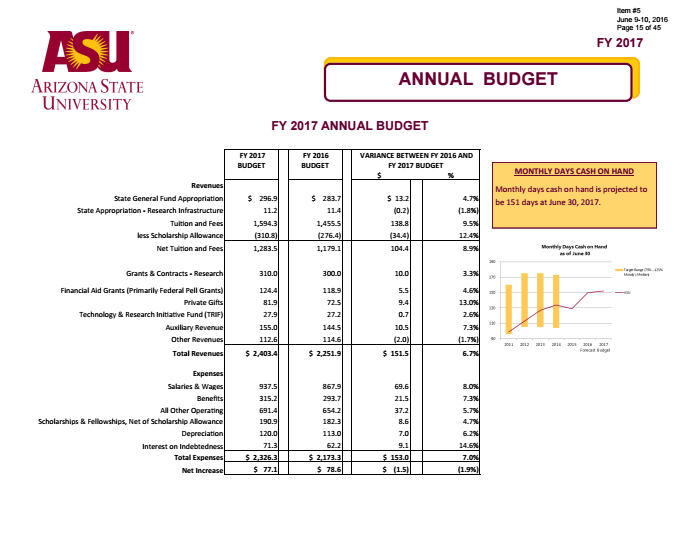June's Arizona Board of Regents Meeting begins tomorrow at Northern Arizona University's campus in Flagstaff, and with it comes a nearly unnavigable stream of executive sessions, budget talks, votes and approvals.
Here are some of the biggest items that will come up in this week's meeting and potentially affect ASU students
ASASU Council of Presidents Financial Aid Request
During talks for the setting of this coming academic year's tuition at ASU, the Associated Students of ASU Council of Presidents, the governing body consisting of the student government presidents from each campus and the graduate student association, supported the tuition increase so long as the University cooperated with them on a number of requests.
Chiefly, the Council requested that there be a 1.5 percent increase in the average cost of attendance covered by institutional need-based aid.
 |
| Michael Crow, ASU Prez |
For some in the Council, this is especially surprising as in May, Gov. Ducey signed a bill providing the University with $17,895,100 in funding, of which nearly $15 million was expendable for any need, as well as $7 million in one-time funds usable for any need, which did not make an appearance in the tuition budget.
That said, statute prevents state monies from being used to fund financial aid, though the money could be used for other purposes to free up funding for financial aid.
Regardless, financial aid did increase with this budget. The amount of scholarship money taken away from tuition revenue increased by 12.4 percent, which would indicate an increased investment in financial aid. And, the budget describes an investment of $51.6 million in financial aid, of which $35.3 million is institutional.
However, that is less than the $38.1 million in institutional financial aid described in the original tuition proposal, which came to light prior to the increase in general funding from the aforementioned bill.
Moreover, the lack of specificity in these numbers and the lack of consistency in the numbers across different documents means it is difficult to tell where the increased funding will go and from where it came.
An increase in institutional funding would be represented in a figure called average institutional gift aid, which, according to this year's tuition proposal, was on average $7,137 per student in 2015. However, that figure does not appear in the budget, making it even more difficult to tell.
Since the Regents ultimately have the power to approve or deny the budget, the Council will have to decide whether or not they feel their request was honored, and then could ultimately make their case to the Regents to force an amendment to the budget.
The issue is as political as it is fiscal: if the request was not honored in the budget and is not at the meeting, the nature and efficacy of student representation would be called into question.
Approval of ASU Capital Development Plan and Infrastructural Improvements
The ABOR Business and Finance committee will review the capital development plans from each campus, which include a number of infrastructural and structural improvements to each university. ASU's plan totals $177.3 millionThe plan includes improvements to classroom space, general academic space, laboratory space and Armstrong Hall, the current home to the Sandra Day O'Connor College of Law.
The plan also covers significant renovations to Gammage Auditorium totaling more than $9.1 million, and the $96 million third phase of the Sun Devil Stadium renovation.
The University also seeks an extension of its lease of space in the Arizona Center adjacent to the downtown Phoenix campus, which holds more than 35,000 square feet of office and classroom space.
Approval of Intergovernmental Agreement between ASU and City of Mesa
The University made public its plans to create a presence in downtown Mesa earlier this year, the cost of which would be footed by a sales tax increase in the city that will come on the ballot in November.
Last week, the Mesa city council approved an intergovernmental agreement between the city and the University outlining the plans for the ASU presence, and now, the Board has to do the same.
If it does, the tax increase will go on the ballot in Mesa, and if the voters pass it, development of the ASU presence can begin.
The meeting will also include several executive sessions, during which one point of discussion will be the potential for an ASU presence in the city of Payson. This isn't the first time this idea has arisen, but no official agreements or negotiations have been entered into previously.
That said, the fact that the University is seeking legal counsel about the potential ASU presence in Payson could mean things are in the works.
Reach the reporter at Arren.Kimbel-Sannit@asu.edu or follow @akimbelsannit on Twitter.





No comments:
Post a Comment